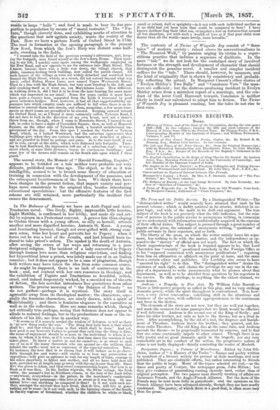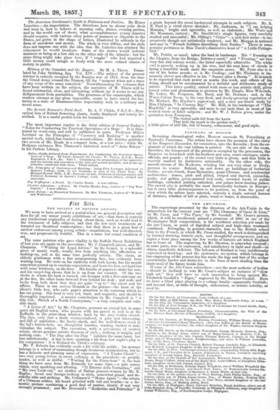PUBLICATIONS RECEIVED.
Booxs.
A History of Prices, and of the State of the Circulation, during the nine years 1848-18543. In two volumes ; forming the fifth and sixth volumes of the History of Prices from ITitt to the Present Time. By Thomas Tooke, F.R.S., Corresponding Member of the Institute of France; and William Newmarch. Volumes V. and VI.
A Journal of Two Years' Travel in Persia, Ceylon, St.e. By Robert B. M. Binning, Esq., Madras Civil Service. In two volumes.
The Life and Titnes of Sir Peter Carew, Kt., (from the Original Manuscript, ) with an Historical Introduction and Elucidatory Notes, by John Maclean, Esq., F.S.A., &c., Keeper of the Records of her Majesty's Ordnance in the Tower of London.
The English Constitution in the Reign of King Charles the Second. By Andrew Amos, Esq., Downing Professor of Law in the University of Cambridge, and late Member of the Supreme Council of India.
The Angler in the Lake District ; or Piscatory Colloquies and Fishing Excur
sions in Westmoreland and Cumberland. By John Davy, F.R.S., Re. Conversations on Topics of Interest between Two Friends.
Marguerite's Legacy : a Novel. By Mrs. S. F. Steward, Author of The Prediction," Ike. In three volumes.
The Balance of Beauty; or the Lost Image Restored. By Jane Kennedy, Author of " Sketches of Character," Re.
A Twine of Way-side Ivy; or Three Tales from an Old Woman's Note-book. By Margaret Casson, Authoress of "Cross Purposes," Sic.
The Press and the _Public Service. By a Distinguished Writer.—The "distinguished writer" would scarcely have attained that rank by his present volume ; which is feebly satirical in its attacks, deficient in cogent logic, and wide of the mark in its drift and argument. The true subject of the book is not preciaely what the title indicates, but the relation of persons in the public service to anonymous writing, in connexion (as we understand) with information confidentially acquired lathe exercise of their official duties. This subject is pursued through a great number of papers on the press, the rationale of anonymous writing, " questions " of public servants by their superiors, and so forth. The liberty of the press, on which the writer mainly bases his argument, has nothing to do with the matter, and the independence as opposed to the " slavery " of official men not much. The fact on which the whole superstructure of the hook is founded appears to be, that Lord Clarendon has "recently" questioned somebody in the Foreign Office as to his "supposed connexion with anonymous publications " ; requiring from him an affirmation or affidavit on the point at issue, and the sante from a certain editor and publisher. His Lordship also seems to have "asserted his right" to do this. The "distinguished writer" denies the existence of such right, and claims the privilege for any one in the employ of a department to write anonymously what he pleases about that department, as well as to be shielded from questions by his superiors in the service. To this privilege, in anything like the extent claimed, we must demur.
Andrea.,: a Tragedy, in Five Acts. By William John Barrett— There is little poetry properly so called in this play, and no very striking dramatic power, while the spirit throughout is conventional. It is, however, a very clever convention ; exhibiting skill in the situations and business of the action, with sufficient appropriateness in the sentiments and force in the diction.
The elements of the story are not new, but they are well put together, and made the occasion for some passages that we think would be effective if well delivered. Andreas is the second son of the King of Sicily; and hates his elder brother, not only as heir to the throne, but as a rival in love. After accomplishing, by the aid of a tool, the disgrace and banishment of Theodore, Andreas meets his brother ; they quarrel, and Andreas stabs Theodore. The old King dies at the same time, and Andreas ascends the throne—to be perpetually tormented by remorse, and to find that one crime continually impels to other crimes. Though there is no lofty poetry and no great dramatic spirit in the tragedy, nor any very remarkable art in the conduct of the action, the progressive nature of crime is not badly displayed—faintly reminding the reader of Macbeth.
Peripatetic Papers ; a Volume of Miscellanies. Edited by John Gilchrist, Author of "A History of the Turks."—Essays and poetry written by members of a literary society for perusal at their meetings, and now published. They are creditable efforts, but, rather interesting to friends than the public at large. Many of the topics selected are real,—as the times and poetry of Cowper, the newspaper press, John Milton ; but they give evidence of painstaking reading cleverly used, rather than of original perception. The two papers most directly treating of affairs are Insurance Frauds, and the Anglo-French Alliance. But the facts of the Frauds may be read more fully in periodicals ; and the opinions on the French Alliance have been advaneed already, though they are here neatly condensed. The poetry, of which there is a good deal, is often more raey than the prose.
The American Gentleman's Guide to Politeness and Fashion. By Henry Lunettes.—An importation. The directions how to choose your dress and wear it, how to behave at morning calls, dinner, evening parties, and in the world out of doors, what accomplishments young America should acquire, with various other points of manners or etiquette in the States, are given in the shape of letters, illustrated by addenda in the form of anecdotes and stories. The whole is very diffuse, and the style does not impress one with the idea that Mr. Lunettes has attained the refinement he would inculcate. Some of the stories would indicate manners as being at a low ebb on the other side of the Atlantic ; but the same thing might take place here, if "roughs" who had acquired a little money could mingle so freely with the more refined classes of society in public.
History of the Consulate and the Empire. By M. A. Thiers. Translated by John Stabbing, Esq. VoL XIV.—The subject of the present volume is entirely occupied by the Russian war of 1812, from the time the Grand Army crossed the Niemen, till the "moment when not a trace of any corps of the army remained." Notwithstanding the volumes that have been written on the subject, the narrative of M. Thiers will be found substantial, clear, and interesting, without (as it seems to us) any disfigurement from partialities. The greatness of the catastrophe, which renders attempt at any gloss impossible, seems to have raised the historian to a state of Rhadamanthine impartiality both in a military and moral sense.
The British Botanist's Field-Book, By A. P. Childs, F.R.C.S.—Synoptical lists of British flowering plants, neatly displayed and tersely desailed. It is a useful pocket-book for botanists.
The most important reprint is the third edition of General Piusley's "Rules for Conducting the Practical Operations of a Siege." It is illustrated by wood-cuts, and will be published in parts. Professor Mills's Lectures on the Principles of "Currency and Banking" is another special work, which has reached a second edition. Mr. Bentley publishes two novels of Mr. Ronde in a compact form, at a low price ; while Mr. Hodgson embraces Mrs. Thomson's historical novel of "Anne Boleyn" in his Parlour Library.
Bake, chiefly deduced from Experiment, for Conducting the Practical Operations of a Siege. By Lieut.-General Sir Charles W. Pasley, K.C.B., Itoyal Engineers, F.R.S., Sre. Part I. Containing the preparation of the materials, and the tracing and execution of the first and second parallels, and of the approaches connected with them. Third edition.
The Principles of Currency and Banking : being Five Lectures delivered in Queen's College, Cork, to the Students in Arts of the Third Year. By Richard Homer Mills, A.M., Banister-at-law, Professor of Jurisprudence and Political Economy in Queen's College, Cork. Second edition, revised and corrected, Peg TVoffington: a Novel. By Charles Reade. A new edition.
Christie Johnstone: a Novel. By Charles Iteade, Esq., Author of " Peg Woffington." A new edition.
Anne Boleyn : an Historical Romance. By Mrs. Thomson, Author of" Widows and Widowers."



























 Previous page
Previous page